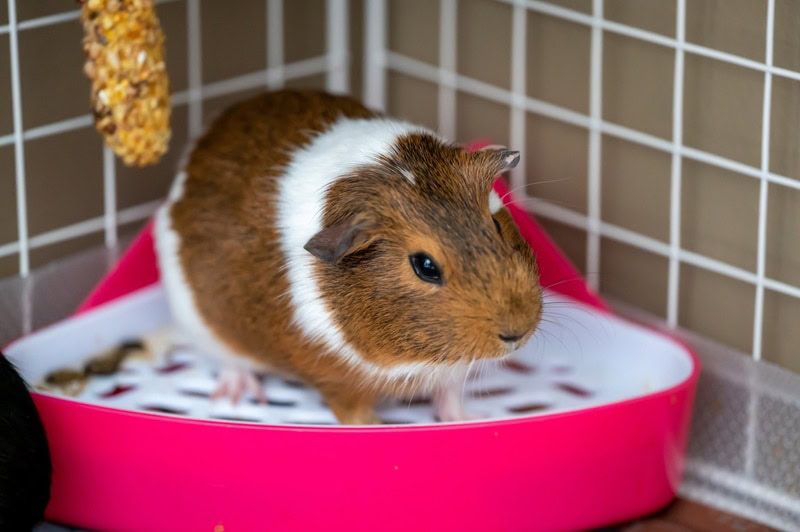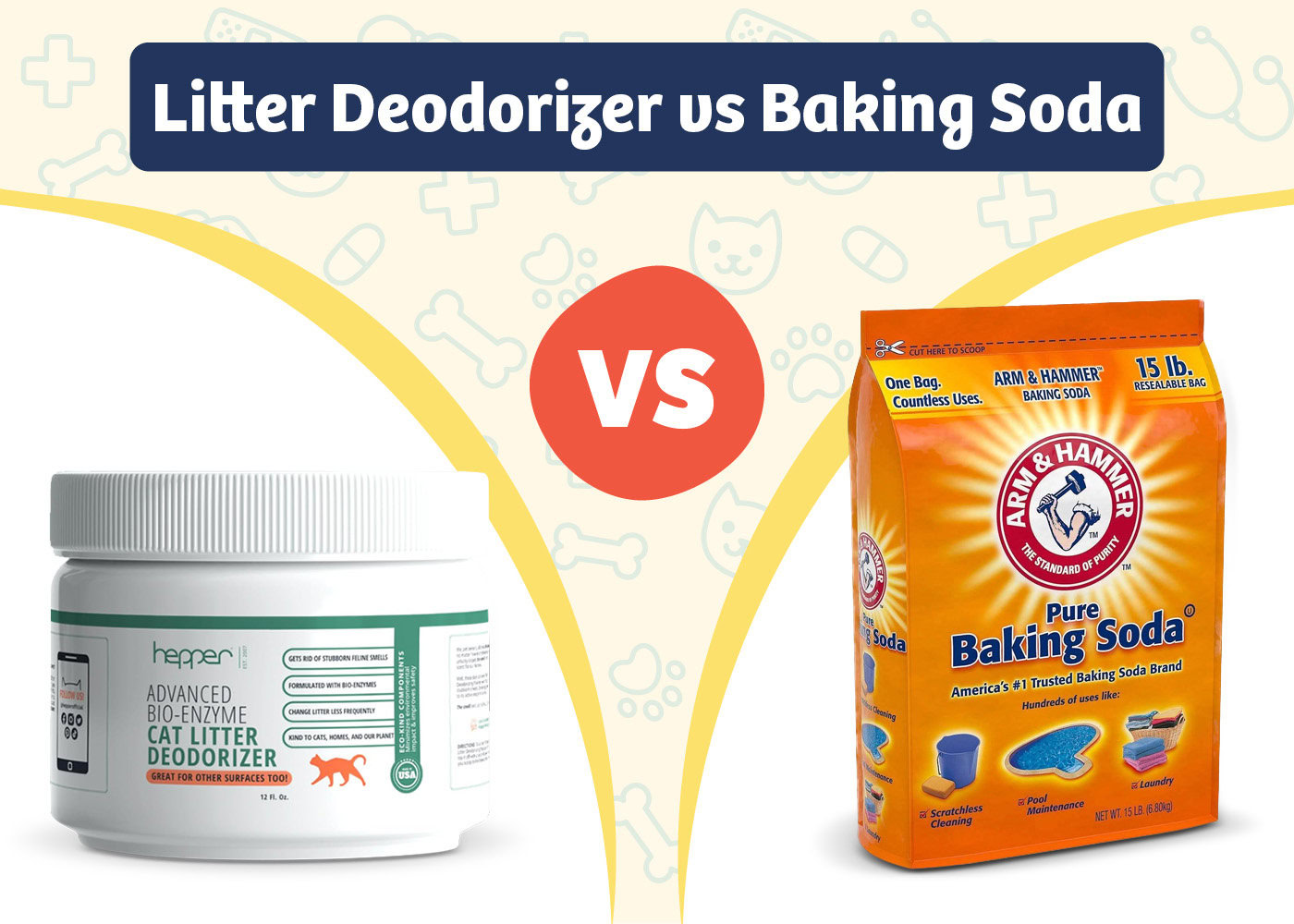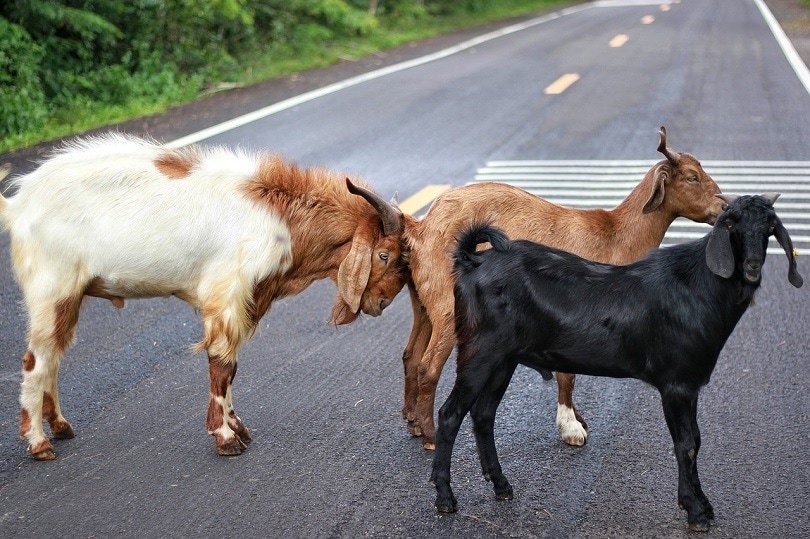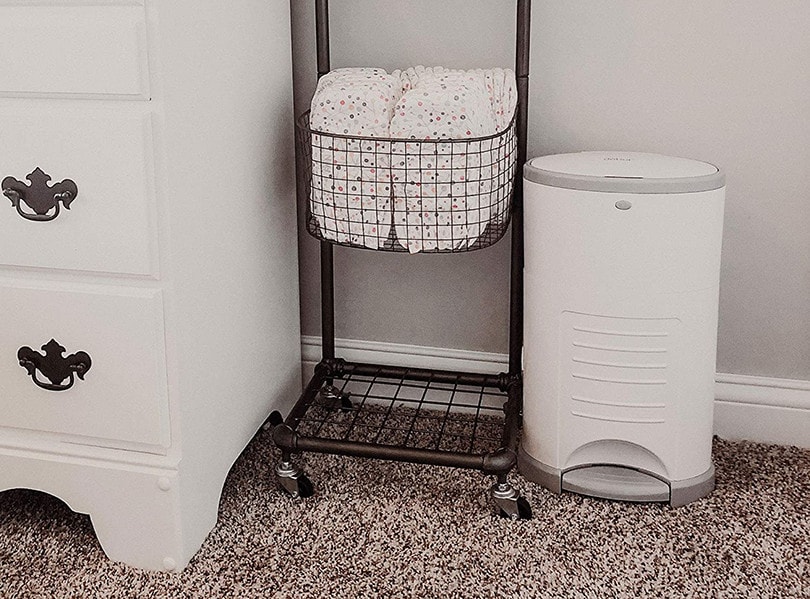Guinea pigs are squeaky and cute and bring such joy to our lives—that is, until they pee on the brand-new sofa or cushion cover or their home environment starts to smell a little whiffy. These rodents’ urine smells can quickly build up and become quite pungent, especially male cavies’ pee.
In some cases, all that’s required is a good old-fashioned deep clean of your guinea pig’s home. In other instances, you have to gather commercial cleaning products or household products like baking soda to tackle tough stains.
In this post, we share 10 ideas for getting rid of guinea pig urine smells and stains and making your home smell fresh and clean again.

The 10 Tips for Removing Guinea Pig Odors and Stains
1. Deep Clean Your Guinea Pig’s Cage
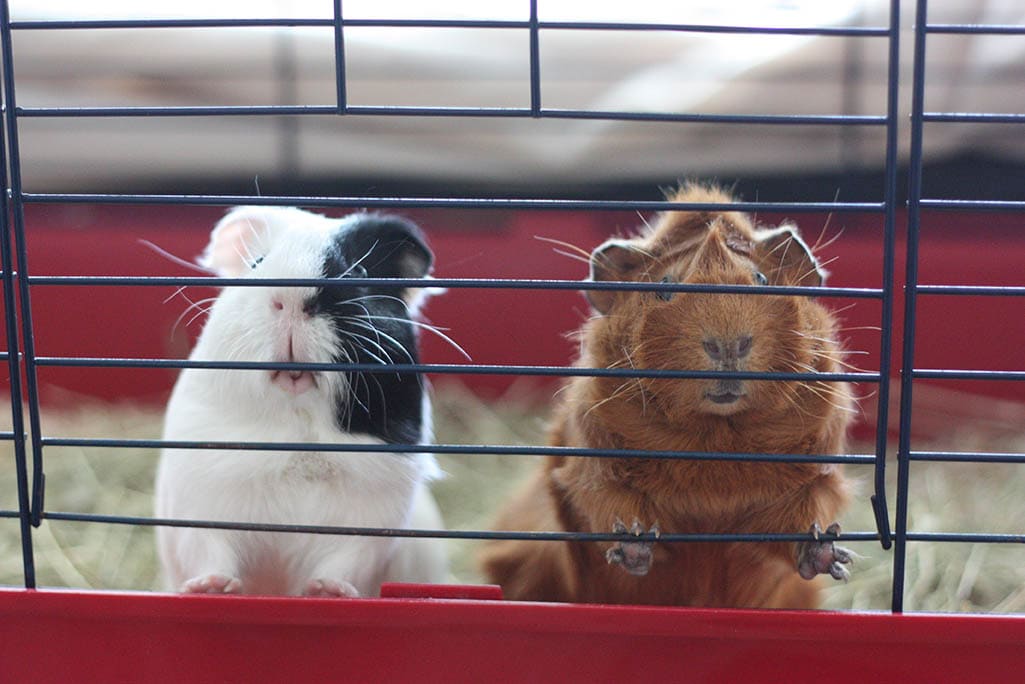
If the smell is coming from your guinea pig’s cage or hutch, your standard cleaning procedures might not do, so a deep and thorough clean is in order. Remove your guinea pig from the cage, and put them somewhere safe. Take everything out—bedding, toys, food dishes, water bottles, etc.—and wash it all thoroughly with a pet-safe disinfectant, including the base of the cage.
2. Do Daily Checks
A few simple daily checks and spot cleans can go a long way toward keeping your guinea pig’s home smelling fresh. Check for wet, soiled bedding, remove it, and wipe down the area. Also, get rid of the remnants of vegetables and other spoiled foods that your guinea pig hasn’t touched.
3. Bathe Your Guinea Pig
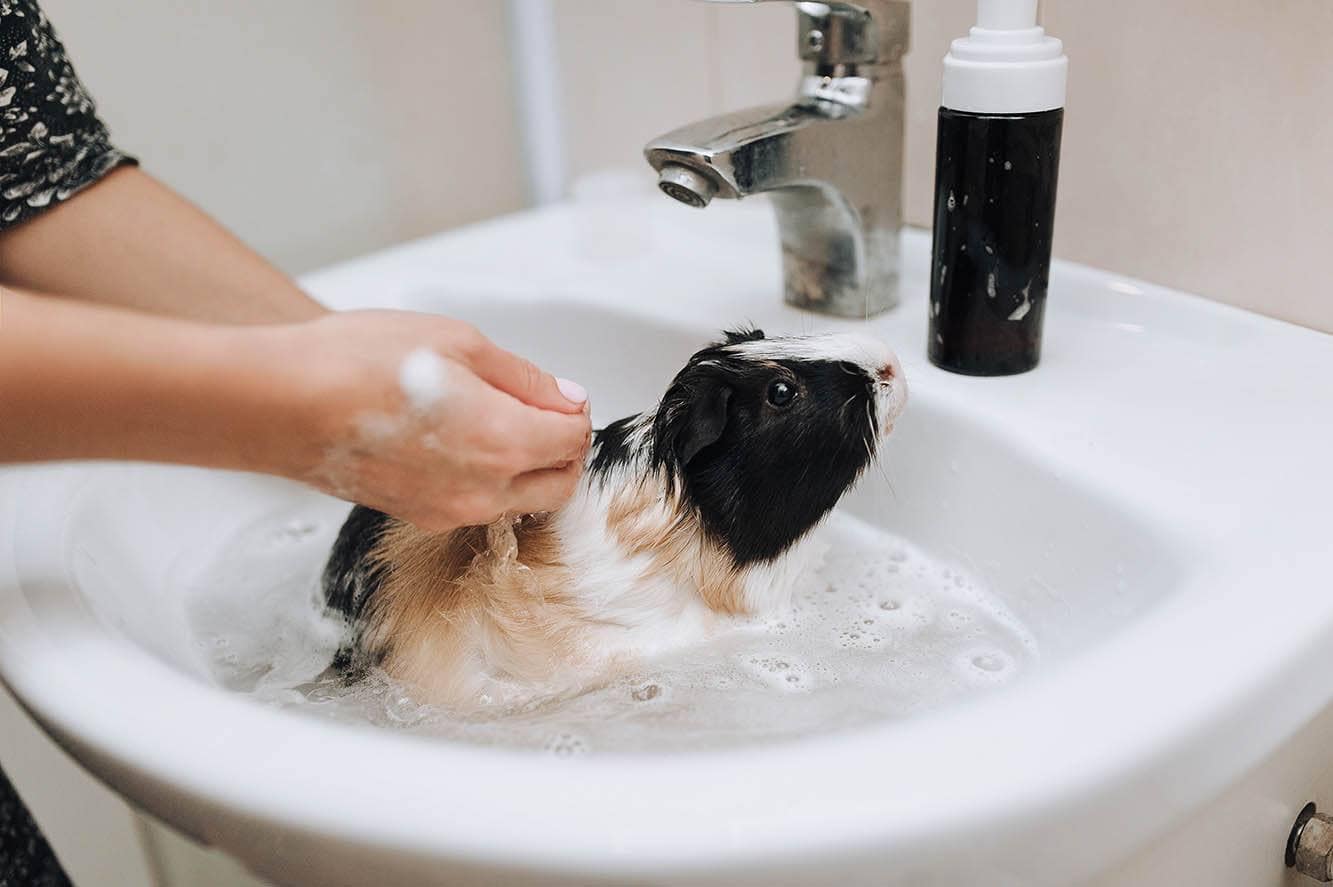
Sometimes, it’s necessary to bathe your guinea pig, especially a male. Males mark their territory by leaving behind a scent. Over time, this scent can build up in their fur, so a good bath is in order. Guinea pigs should only be bathed if necessary, though, as they clean themselves pretty well.
Never use human shampoo or conditioner; bathe your guinea pig gently with a pet-safe shampoo specially designed for them. They’re likely to be quite stressed out when you bathe them, given their somewhat nervy temperaments, so be slow and gentle. Place the guinea pig at the bottom of an empty bucket or basin with a washcloth under them to stop them from slipping about.
Scoop warm (not hot) water onto their back, and gently rub in the shampoo, avoiding the face and eyes. Rinse them well, then towel them dry. You can also carefully blow dry on the lowest heat and speed settings.
4. Use Baking Soda and Vinegar on Your Furniture
If your guinea pig has peed on your sofa or mattress, don’t panic—there’s an easy way to get rid of the stain and smell using simple household items. Mix equal parts distilled white vinegar and water in a spray bottle. Spray it on the urine spot, then cover the area with baking soda. Leave for a few hours, then vacuum up the baking soda.
5. Use a Commercial Cleaner
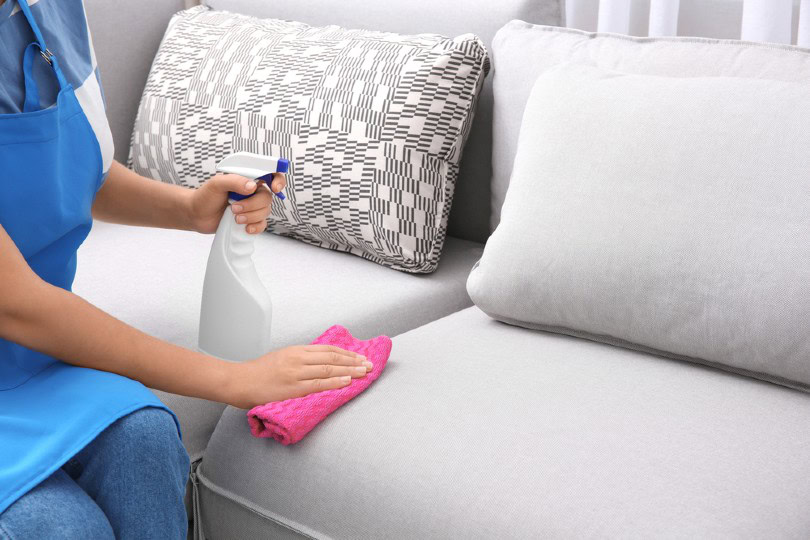
Another option for peed-on furniture is to buy a commercial pet enzymatic cleaner. These are specially formulated to deal with pet urine, vomit, or feces stains on your furniture and can be found in hardware stores, supermarkets, and online.
If you're trying to find an enzyme cleaner that does it all, we highly recommend our favorite cleaner, the Hepper Advanced Bio-Enzyme Pet Stain & Odor Eliminator Spray.
| Rating | Image | Product | Details | |
|---|---|---|---|---|
 |
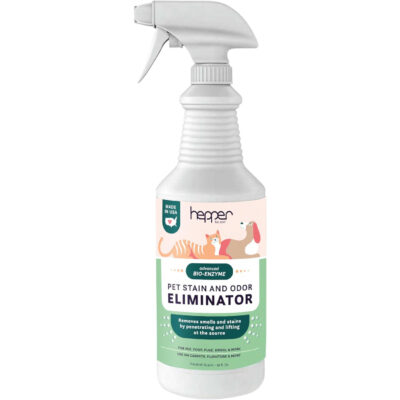 |
Hepper Advanced Bio-Enzyme Pet Stain & Odor Eliminator Spray |
|
CHECK PRICE |
It permanently removes the very worst stains and smells you can imagine and makes clean up a breeze. There's even a 100% satisfaction guarantee! Click here to order a bottle today.
At PangoVet, we’ve admired Hepper for many years, and decided to take a controlling ownership interest so that we could benefit from the outstanding products of this cool cat company!
6. Choose Appropriate Bedding
Good bedding choices for your guinea pig’s home are essential when it comes to odor control. You’ll want to go for something pet-safe, absorbent, and preferably with odor-control powers. If you’re using bedding from around your home, such as fleece (a great choice for guinea pigs) or towels, make sure it is washable, and freshen it up regularly.
Avoid using newspaper and dusty bedding, as these can be harmful to your guinea pig and don’t absorb odors well. Change your chosen bedding regularly; how often you do this depends on how smelly your cavy tends to get and how many you have. Some people have to clean the hutch or cage every few days, while others can get away with doing it once per week.
7. Invest in an Air Purifier
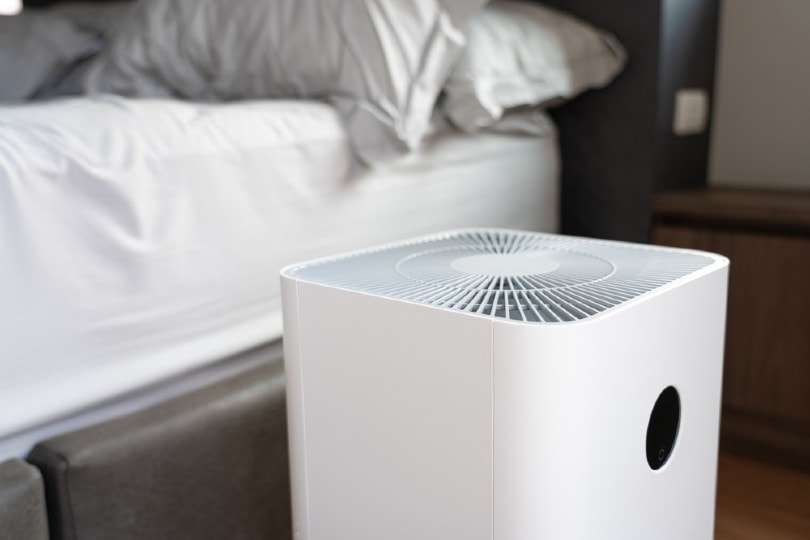
If guinea pig smells are a consistent problem, you might want to consider getting an air purifier. Although they won’t do much by way of tackling strong or overpowering urine smells (only deep cleaning can solve this problem), they can help neutralize more general pet smells and control dander, allergens, bacteria, and viruses.
8. Feed Them a Healthy, Balanced Diet
Feeding your pet properly is a big step toward reducing the unpleasant smells your guinea pig may produce. It helps keep their gut in balance, and providing plenty of clean water helps prevent urinary and kidney issues. They eat an herbivore’s diet, and you can supplement their standard pellet-form food with a range of fresh vegetables and fruits. Also, guinea pigs need vitamin C supplements because they can’t make vitamin C themselves.
9. Monitor Your Guinea Pig’s Health
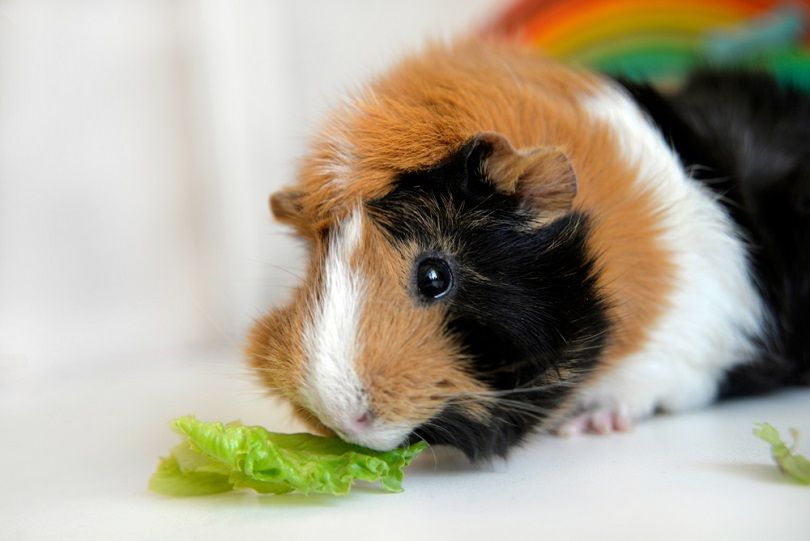
Guinea pigs are usually clean animals, and although their urine has a smell, it shouldn’t be foul-smelling or “fishy.” If this sounds like your guinea pig at the moment, it’s best to get them checked out by a vet for a urinary tract infection. There could be something going on that needs to be treated.
10. Groom Your Guinea Pig Regularly
In addition to occasional bathing if you have an especially stinky cavy and of course, maintaining the cleanliness of their environment, grooming regularly is a good way to help keep those general guinea pig smells at bay. Groom them once or twice a week to get rid of dead hair and skin and to check for parasites like mites.

Conclusion
Although guinea pig odors can be frustrating, you’re certainly not doomed to live with them forever. Most of the time, it’s a simple case of their environment needing a good cleaning and keeping up with regular cleaning routines. If your guinea pig smells especially bad, is producing fishy or foul-smelling urine, or is peeing excessively, it’s time to get them to a vet to find out what’s going on.
Featured Image Credit: Lost_in_the_Midwest, Shutterstock
Contents
- The 10 Tips for Removing Guinea Pig Odors and Stains
- 1. Deep Clean Your Guinea Pig’s Cage
- 2. Do Daily Checks
- 3. Bathe Your Guinea Pig
- 4. Use Baking Soda and Vinegar on Your Furniture
- 5. Use a Commercial Cleaner
- 6. Choose Appropriate Bedding
- 7. Invest in an Air Purifier
- 8. Feed Them a Healthy, Balanced Diet
- 9. Monitor Your Guinea Pig’s Health
- 10. Groom Your Guinea Pig Regularly
- Conclusion
